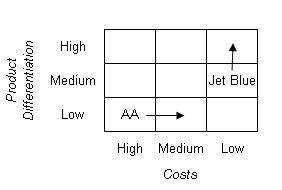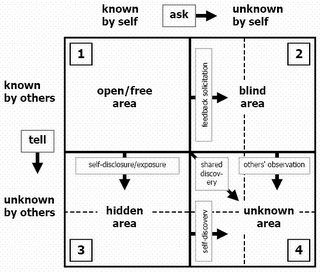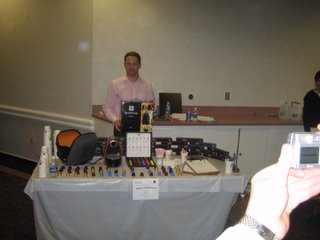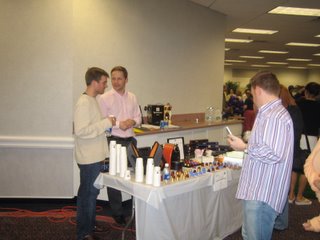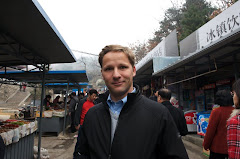Tuesday, February 28, 2006
Same Result - Different cause
Quote from my leadership class:
There are kinds of people:
1. Those, who read the New Yorker
2. Those, who stopped reading the New Yorker
3. Those, who never read the New Yorker.
2. and 3. look the same as they don't read the New Yorker, but they did it (or did not) for different reasons. Therefore it's important not to look only at results but also on how and why they occured.
There are kinds of people:
1. Those, who read the New Yorker
2. Those, who stopped reading the New Yorker
3. Those, who never read the New Yorker.
2. and 3. look the same as they don't read the New Yorker, but they did it (or did not) for different reasons. Therefore it's important not to look only at results but also on how and why they occured.
Monday, February 27, 2006
Lifecycle of teams
There are 4 lifecycles for a team:
1. Forming (e.g. Roles are still undefined)
2. Storming
3. Norming
4. Performing
In addition, one can break out 4 types of team-members:
1. Tasks (i.e. the workhorse)
2. Pragmatic (i.e. the projectmanager)
3. Process (i.e. the moderator/facilitator)
4. Creatives (i.e. the resource person, agitator or synthesizer)
All four are essential and beneficial to a team.
1. Forming (e.g. Roles are still undefined)
2. Storming
3. Norming
4. Performing
In addition, one can break out 4 types of team-members:
1. Tasks (i.e. the workhorse)
2. Pragmatic (i.e. the projectmanager)
3. Process (i.e. the moderator/facilitator)
4. Creatives (i.e. the resource person, agitator or synthesizer)
All four are essential and beneficial to a team.
Friday, February 24, 2006
Abilene Paradox
"Groups of people do things that later they say they didn't want to do but went ahead because they thought everyone else wanted to." - Dialogue (Dia from latin "through"; logos from latin "word") can help to avoid making hasty decisions based on faulty assumptions.
Jerry B. Harvey, The Abilene Paradox, Lexington Books, 1988.
On a hot afternoon visiting in Coleman, Texas, the family is comfortably playing dominoes on a porch, until the father-in-law suggests that they take a trip to Abilene (53 miles away) for dinner. The wife says, "Sounds like a great idea." The husband, despite having reservations because the drive is long and hot, thinks that his preferences must be out-of-step with the group and says, "Sounds good to me. I just hope your mother wants to go." The mother-in-law then says, "Of course I want to go. I haven't been to Abilene in a long time."
The drive is hot, dusty, and long. When they arrive at the cafeteria, the food is as bad. They arrive back home four hours later, exhausted.
One of them dishonestly says, "It was a great trip, wasn't it." The mother-in-law says that, actually, she would rather have stayed home, but went along since the other three were so enthusiastic. The husband says, "I wasn't delighted to be doing what we were doing. I only went to satisfy the rest of you." The wife says, "I just went along to keep you happy. I would have had to be crazy to want to go out in the heat like that." The father-in-law then says that he only suggested it because he thought the others might be bored.
The group sits back, perplexed that they together decided to take a trip which none of them wanted. They each would have preferred to sit comfortably, but did not admit to it when they still had time to enjoy the afternoon.
Jerry B. Harvey, The Abilene Paradox, Lexington Books, 1988.
On a hot afternoon visiting in Coleman, Texas, the family is comfortably playing dominoes on a porch, until the father-in-law suggests that they take a trip to Abilene (53 miles away) for dinner. The wife says, "Sounds like a great idea." The husband, despite having reservations because the drive is long and hot, thinks that his preferences must be out-of-step with the group and says, "Sounds good to me. I just hope your mother wants to go." The mother-in-law then says, "Of course I want to go. I haven't been to Abilene in a long time."
The drive is hot, dusty, and long. When they arrive at the cafeteria, the food is as bad. They arrive back home four hours later, exhausted.
One of them dishonestly says, "It was a great trip, wasn't it." The mother-in-law says that, actually, she would rather have stayed home, but went along since the other three were so enthusiastic. The husband says, "I wasn't delighted to be doing what we were doing. I only went to satisfy the rest of you." The wife says, "I just went along to keep you happy. I would have had to be crazy to want to go out in the heat like that." The father-in-law then says that he only suggested it because he thought the others might be bored.
The group sits back, perplexed that they together decided to take a trip which none of them wanted. They each would have preferred to sit comfortably, but did not admit to it when they still had time to enjoy the afternoon.
Loop learning
Leading organization class:
- Single-loop learning: A single question that one-dimensionally answers a one dimensional question, e.g. like a "thermostat": If it's too warm, the heater is turned off and vice-versa.
- Double-loop learning: "Why should the temperatur trigger be at this temperatur?"
- Triple-loop learning: "Am I measuring with the right method? Should I look at other measures, e.h. humidity?"
Monday, February 20, 2006
The Winner's curse
Savvy bidders will avoid the winner's curse by bid shading, or placing a bid that is below what they believe the good is worth. This may make it less likely that the bidder will win the auction, but it also protects them from overpaying in the cases where they do win. A savvy bidder knows that they don't want to win if it means they will pay more than a good is worth.
Saturday, February 18, 2006
I'm ok - you're ok
Dr. Thomas Harris introduces the concept of the four different life positions that each of us adopts at any given time. All of us apparently go through four life positions ending up with the last one in a sequential manner except some of us get stuck in the earlier stages (this results in problems that typically need therapy). These four positions are -
1. I'm Not OK, You're OK
2. I'm Not OK, You're Not OK
3. I'm OK, You're Not OK
4. I'm OK, You're OK
In "adult"-mode we have confidence in ourselves and in others - and treat both with respect. The goal should be to be more often is this last "cell", i.e. adult mode.
Wednesday, February 08, 2006
Dealing with competitors
Comment from my strategy class: "Don't crash your competitor so much that he can restructure and is stronger than before."
Sunday, February 05, 2006
Monticello Visit
Friday, February 03, 2006
Thursday, February 02, 2006
Darden Brand Challenge
Elephant circle
Heard of a cool story in my leadership class:
Elephant trainers use a very interesting technique to harness their animals. When the elephant is still very young, the trainers attach one end of a strong chain to one of the elephants legs, and the other end to a stake firmly driven into the ground. This allows the animal the freedom of a very defined circle. While harnessed day after day, the elephant learns that this circle is its only territory. As the years go by, the chain is exchanged for thinner and thinner ropes. The trainers know that the elephant could walk away at any time, but the elephant does not catch on, and so remains within the defined circle. What is your circle? What are your self-limiting beliefs?
Elephant trainers use a very interesting technique to harness their animals. When the elephant is still very young, the trainers attach one end of a strong chain to one of the elephants legs, and the other end to a stake firmly driven into the ground. This allows the animal the freedom of a very defined circle. While harnessed day after day, the elephant learns that this circle is its only territory. As the years go by, the chain is exchanged for thinner and thinner ropes. The trainers know that the elephant could walk away at any time, but the elephant does not catch on, and so remains within the defined circle. What is your circle? What are your self-limiting beliefs?
Subscribe to:
Posts (Atom)
